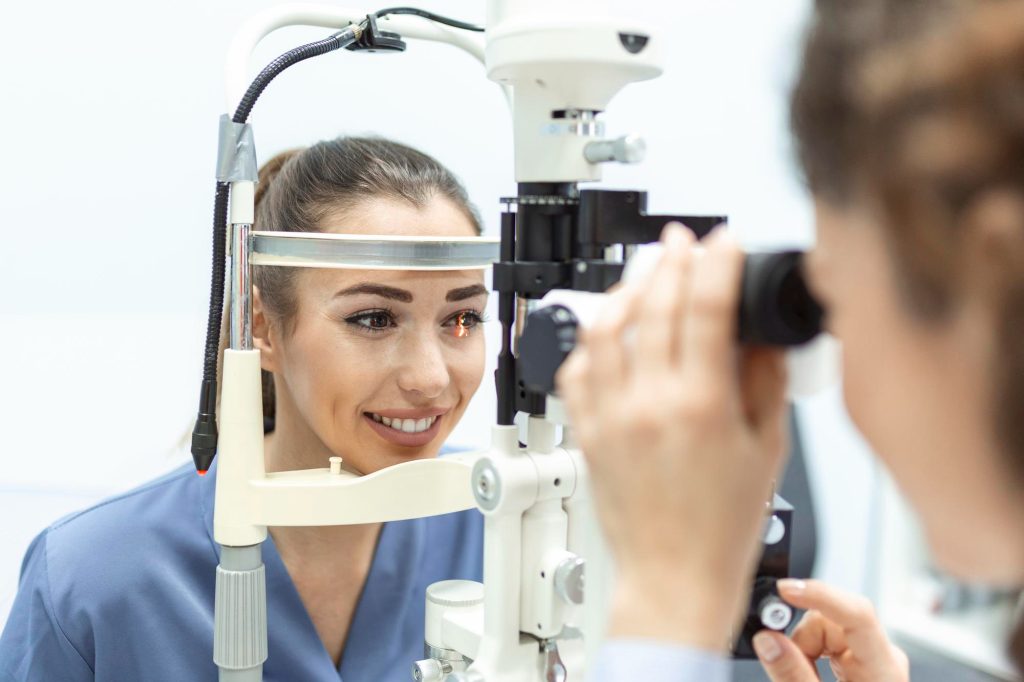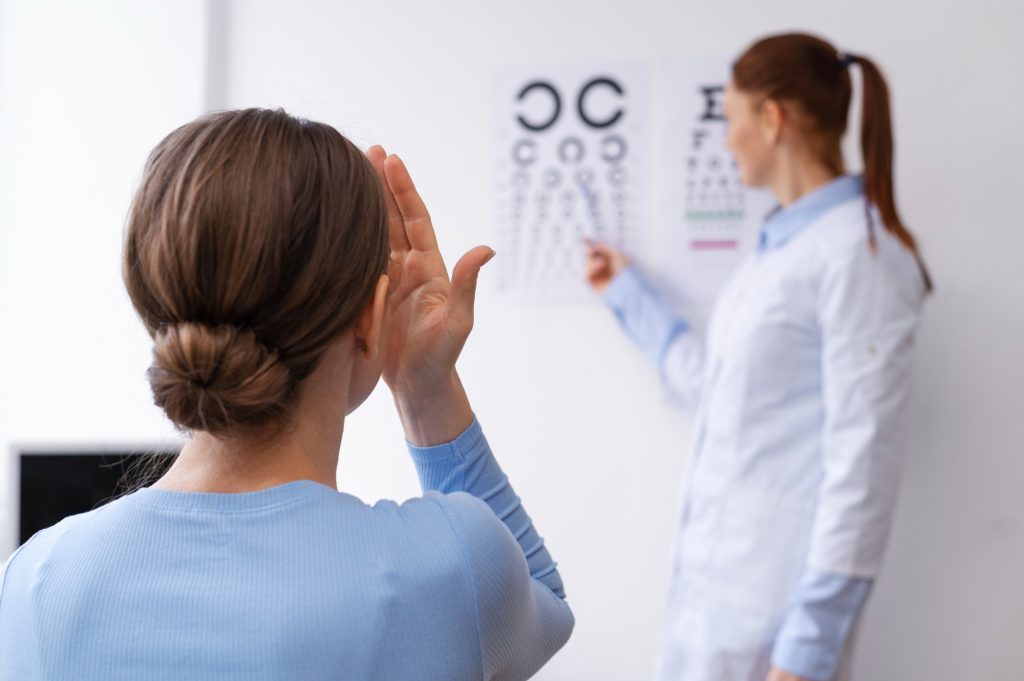Discover the importance of regular eye exams and learn how often you should schedule them.
How Often Should You Have an Eye Exam?

Have you ever wondered how often you should have an eye exam? Well, wonder no more! In this article, we will explore the importance of regular eye exams and discuss the factors that influence how often you should schedule these appointments. So, before you put off your next visit to the eye doctor, let’s dive into the world of vision health!
Understanding the Importance of Regular Eye Exams
Eyes are not just the windows to the soul; they are also the windows to your overall health. Regular eye exams are essential in maintaining optimal vision and detecting potential eye diseases early on. These exams allow your eye doctor to evaluate your vision health, monitor any changes, and provide appropriate treatments or interventions when necessary.
Regular eye exams are not just about checking your ability to read the letters on an eye chart. They involve a comprehensive assessment of your eyes, including tests for visual acuity, color vision, depth perception, and eye muscle movements. Additionally, your eye doctor will evaluate the health of your eyes, checking for signs of conditions like glaucoma, cataracts, and macular degeneration.
By undergoing regular eye exams, you can not only maintain optimal vision but also catch and treat any potential eye diseases before they progress and cause irreversible damage. Prevention is key when it comes to eye health!
The Role of Eye Exams in Maintaining Vision Health
Your eyes are amazing organs that play a vital role in your daily life. From enjoying the beauty of a sunset to reading your favorite books, your eyes are constantly working hard. Just like with any other important aspect of your health, it is crucial to prioritize regular check-ups to keep your eyes in top shape.
Eye exams allow your eye doctor to monitor any changes in your vision and prescribe appropriate corrective measures, such as glasses or contact lenses, if needed. Moreover, by examining the health of your eyes, your doctor can identify potential issues, such as dry eyes, infections, or inflammation, and provide the necessary treatments to restore comfort and prevent further complications.
Furthermore, during an eye exam, your eye doctor may also assess your overall health. Certain systemic conditions, such as diabetes and high blood pressure, can have a significant impact on your eyes. Through a comprehensive eye exam, your doctor can detect signs of these conditions and refer you to the appropriate healthcare professional for further evaluation and management.
So, think of a regular eye exam as an investment in your vision health. By taking the time to see your eye doctor regularly, you can ensure that you continue to see the world clearly and enjoy all the wonders it has to offer!
Detecting Eye Diseases Early Through Regular Check-ups
One of the most significant benefits of regular eye exams is their ability to detect eye diseases at an early stage. Some eye conditions, such as glaucoma and macular degeneration, often show no symptoms in the early stages. In fact, you may not even realize that your vision is being subtly compromised.
However, eye exams can catch these conditions before they progress to more advanced stages, allowing for prompt treatment and better outcomes. This is especially vital for conditions that can cause permanent vision loss if left untreated.
Moreover, regular eye exams can also help in the early detection of other eye conditions, such as cataracts and retinal detachment. These conditions, if left untreated, can lead to significant vision impairment and may require surgical intervention.
By detecting eye diseases early, eye exams provide an opportunity for proactive intervention. Your eye doctor can prescribe appropriate medications, recommend lifestyle changes, or suggest surgical procedures to manage or even reverse the progression of the disease. So, don’t wait until you notice changes in your vision—schedule those regular eye exams and catch potential problems before they catch you!
Factors Influencing the Frequency of Eye Exams
The frequency of eye exams can vary depending on several factors. Let’s explore some of the most common considerations:
Age and Eye Exam Frequency
As we age, our eyes undergo natural changes, increasing the risk of developing age-related eye conditions. For individuals aged 20 to 39, a comprehensive eye exam every two to three years is generally sufficient. However, after reaching the age of 40, it is recommended to have an eye exam every one to two years. This increased frequency allows for closer monitoring of age-related changes and the early detection of conditions that may become more common with age.
Existing Eye Conditions and Regular Check-ups
If you have already been diagnosed with an eye condition, regular eye exams become even more crucial. Conditions like diabetic retinopathy, cataracts, or glaucoma may require more frequent monitoring to ensure that they are well-managed and do not progress rapidly. Your eye doctor will work with you to determine the ideal visit schedule based on your specific needs and conditions.
Lifestyle Factors Affecting Eye Health
Your lifestyle can also impact the frequency of your eye exams. If you have a physically demanding job or participate in activities that pose a higher risk of eye injury, such as contact sports, it may be advisable to schedule more frequent check-ups. Similarly, individuals with certain systemic health conditions, such as diabetes, may also need more regular eye exams to monitor potential complications.
Ultimately, the frequency of your eye exams should be based on a combination of these factors, along with the guidance of your eye care professional. By staying informed and proactive about your eye health, you can ensure that you’re taking the necessary steps to protect your vision every step of the way!
What to Expect During an Eye Exam
Now that you understand the importance of regular eye exams, you might be wondering what exactly goes on during these appointments. Well, fear not! We’ve got you covered with a breakdown of what you can expect:
Pre-Exam Procedures
Before your eye examination begins, the eye care team will gather some essential information about your medical and family history. They may ask questions about any existing eye conditions, medications you’re taking, or any visual concerns you might have. Providing accurate and thorough information will help your eye doctor tailor the examination to your specific needs.
Next, your eye doctor may measure your visual acuity using an eye chart. This classic exam checks how well you can see different letters or symbols from a specific distance. Don’t worry if you’re not perfect—few people are! This test simply helps establish a baseline for further exams.
Vision Testing Procedures
After the initial measurements, your eye doctor will proceed with various tests to evaluate different aspects of your vision and eye health. These tests may involve examining your ability to focus, determining your visual field, assessing color vision, and measuring your eye pressure. Additionally, your doctor may use specialized equipment to examine the structures of your eyes more closely.
Throughout these tests, your eye doctor will likely explain what they are doing and why they are doing it. Feel free to ask questions, as understanding the process can help alleviate any concerns or anxieties you may have.
Post-Exam Follow-ups
Once the examination is complete, your eye doctor will discuss their findings with you. They will explain any diagnoses, recommend treatments or interventions, and provide advice on how to maintain or improve your vision health. Take this opportunity to ask any questions or seek clarification on anything you may be unsure about.
Based on the results of the examination, your eye doctor will determine the appropriate interval for your next follow-up visit. This may range from a few months to a couple of years, depending on your individual circumstances.
Remember, regular eye exams are not a one-time affair—they are an ongoing commitment to your vision health. So, make sure to mark your calendar with your next visit and continue prioritizing your eyesight!
Overcoming Common Barriers to Regular Eye Exams
While regular eye exams are crucial, we understand that life can get in the way sometimes. Here are a few tips to help you overcome common barriers and make those appointments a priority:
Dealing with Fear or Anxiety about Eye Exams
If you’re feeling anxious about eye exams, you’re not alone. The thought of having your eyes examined can be intimidating. However, remember that your eye care team is there to help and support you throughout the process. Communicating your fears or anxieties with your doctor can go a long way in making you feel more comfortable.
Additionally, try to focus on the long-term benefits of regular eye exams and remind yourself that you are taking proactive steps to protect and preserve your vision health. Sometimes a little positive self-talk can help conquer those fears!
Addressing Cost and Accessibility Issues
Financial barriers or difficulties accessing eye care services can also prevent individuals from getting regular eye exams. However, there are often resources available to help. Check with your insurance provider to understand your coverage for eye exams and related services. Additionally, many communities offer programs or organizations that provide free or low-cost eye care for those in need.
If transportation is a challenge, consider reaching out to local organizations or clinics that may offer assistance or arrange transportation for your appointments. Don’t let logistical obstacles stand in the way of your eye health!
The Consequences of Neglecting Regular Eye Exams
Now that we’ve discussed the importance of regular eye exams and ways to overcome common barriers, let’s take a moment to understand the potential consequences of neglecting these appointments:

Potential Vision Loss and Eye Health Risks
Eye diseases and conditions can progress silently, without any noticeable symptoms in the early stages. By avoiding regular eye exams, you risk missing crucial opportunities for early detection and intervention. Untreated conditions like glaucoma or macular degeneration can lead to permanent vision loss, significantly impacting your daily life and independence.
Don’t let a lack of check-ups jeopardize your vision. Schedule those eye exams and give yourself the best chance at preserving and protecting your eyesight!
The Impact on Overall Health and Quality of Life
Regular eye exams not only play a crucial role in vision health but also serve as an opportunity for early detection of other systemic health conditions. Some diseases, like diabetes or hypertension, often present changes in the eyes that can be detected during an eye examination.
By catching these conditions early, you can seek appropriate treatment, improve overall health outcomes, and potentially prevent complications in other areas of your body. Your eyes are a window into your overall health, so make sure you’re keeping them well-maintained!
Conclusion
So, how often should you have an eye exam? The answer may vary depending on factors like age, existing eye conditions, and lifestyle. However, a general recommendation is to make regular eye exams a priority to maintain optimal vision health and catch potential issues early on.
Remember, your eyes are precious, and taking care of them should be a top priority. So, don’t delay—schedule that eye exam today and embark on a journey toward clear vision and eye-spiring health!







Thank you for your sharing. I am worried that I lack creative ideas. It is your article that makes me full of hope. Thank you. But, I have a question, can you help me?